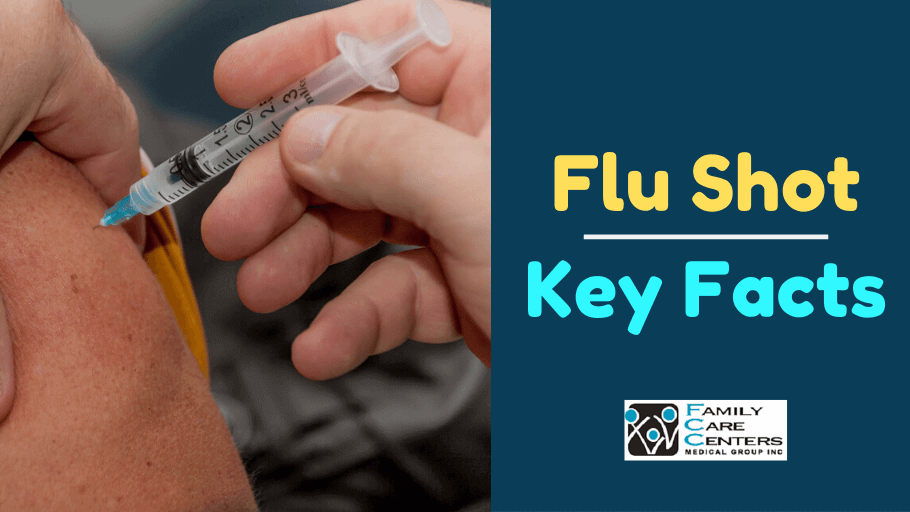

Fountain Valley Urgent Care Permanently Closed. We’re Here to Care for You at Our Other Locations.

Flu season is here again, and so are a lot of myths about the flu vaccine that have gone “viral” across the online communities. For instance, a recent Facebook post from a Highland, California resident drew a lot of attention online, claiming that someone who gets a flu shot is an “active, live walking virus” for the following two weeks. This is a myth as flu shots contain an inactive virus and cannot cause the flu to either the recipient or to others around them.
Every year, there are many misconceptions about the flu vaccine that need to be clarified. In this blog, you’ll find answers to the most common questions or doubts.
Currently with the flu season just starting, it’s difficult to predict how it will go for the entire season. Scientists’ best prediction about any flu season come from two factors: 1) last year’s flu activity in the US, and 2) this season’s flu activity in the Southern Hemisphere.
Last year’s flu season in the US had H1N1 as the dominant strain up until February, after which it flipped to H3N2 around March 2019. While this year’s flu activity in the Southern Hemisphere hasn’t been a particularly a severe one, the dominant strain there was the H3N2, which usually leads to more serious symptoms and increased hospitalizations when compared to the H1N1 strain.
Scientists and specialists predict that H3N2 may be the dominant viral strain this year. However, the good news coming from the flu update published Oct. 11 in the CDC’s Morbidity and Mortality Weekly Report is that this year’s flu vaccine should be a good match and offer protection against both the H1N1 and H3N2 strains.
Flu vaccines are updated so that they match the viruses expected to be circulating during the flu season. For 2019-2020, flu season, all regular-dose flu shots and recombinant vaccines will be quadrivalent, covering four possible viral strains. Check out CDC’s website to learn more about the recommended flu vaccines for this year.
From high-dose shots to nasal spray vaccines, several flu vaccines are available this season, and all are protective. Your healthcare professional will recommend the vaccine that works best for you. There is no specific recommendation for one vaccination over another. However, the Advisory Committee on Immunization Practices (ACIP) recommends an annual flu shot for everyone 6 months and older.
Read Also: Types of Flu - Causes, Symptoms, Prevention Tips
Flu vaccine effectiveness varies every season depending on people’s age and health conditions, vaccine type, and virus type and subtype. The flu seasons’ data from 2010 to 2017 indicate that nasal spray vaccination had lacked effectiveness against H1N1 viruses. However, beginning last season, a new H1N1 vaccine virus is used in the production of the nasal spray vaccination. Some data indicate that the H1N1 vaccine strain will result in improved effectiveness against H1N1 viruses. Based on this, the CDC and ACIP have approved the nasal spray vaccination for select patient populations this season.
A flu shot can cause these side effects:
Side effects of the nasal spray vaccine can include:
These side effects are usually mild, last one to two days, and are much less severe than the influenza infection itself.
The flu shot cannot cause the flu or any other infection, so you can get it even if you have a cold.
It is possible to get the flu even after you have been vaccinated if you are:
The flu vaccine cannot provide 100% protection against the infection if the circulating viruses and vaccine viruses are different. Studies show that the flu vaccine can reduce the severity of the flu even if you get the flu anyway.
According to the Centers for Disease Control and Prevention, a flu shot cannot cause flu illness. The flu shot does not contain any active virus, so it cannot transmit infection. Though you may feel feverish a few days following the vaccination as your body is building immunity, this does not mean that you are sick. The nasal flu vaccine uses a live, weakened form of the influenza virus; check with your doctor to find out if the nasal vaccine is right for you.
This year the CDC has recommended getting flu vaccination around the end of October; however, for those who still haven’t got it, it’s not too late. Flu season begins peak December-January, when the weather becomes colder. If you take your vaccination even now, you’ll be at a better chance of protection against the flu. Keep in mind that it takes about two weeks to develop immunity against the flu after getting vaccinated, so it’s best to get vaccinated early.
You can get a flu vaccine at your doctor’s office, college health centers, pharmacies, some offices and schools, health departments, and urgent care clinics.
Our urgent care clinics in Orange County are providing flu shots. Get vaccinated today to protect yourself and others around you.
Share Your Valuable Thought